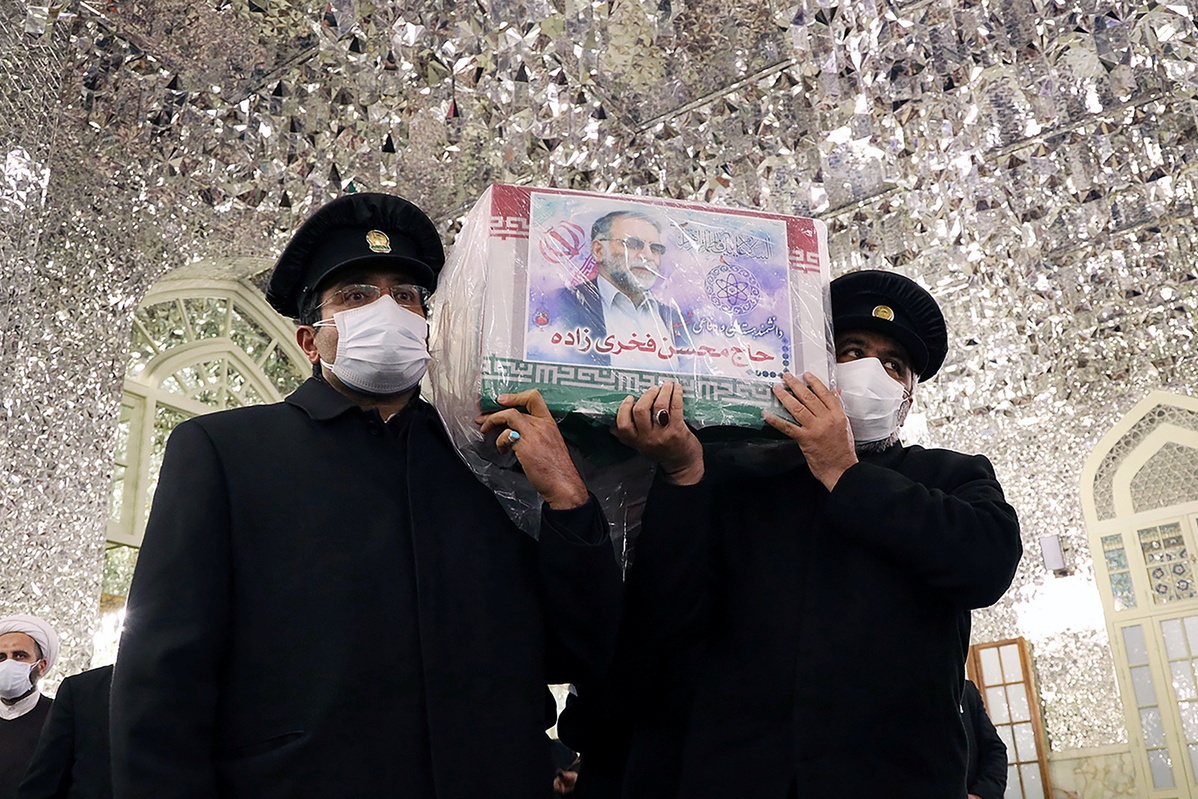
The coffin of the scientist Mohsen Fakhrizadeh killed on Friday is carried at the shrine of Imam Reza in Mashhad, on Sunday. (Photo: REUTERS)
Top nuclear scientist was killed by 'armed terrorists', says defense ministry
TEHERAN-Iran's supreme leader has called for "definitive punishment" of those behind the killing of a scientist who led Teheran's nuclear program, as the death raised fears of increased tensions across the Middle East.
After years of being in the shadows, the image of Mohsen Fakhrizadeh suddenly was to be seen everywhere in Iranian media as his widow spoke on state television and officials publicly demanded revenge for the scientist's killing.
Fakhrizadeh, a high-ranking nuclear physicist, was assassinated near the capital city of Teheran by "armed terrorists", the defense ministry said.
"The Iranian nation will not allow the crime to remain unanswered," the official IRNA news agency quoted President Hassan Rouhani as saying, adding that he had said his country would respond to the assassination at an "appropriate" time.
Iran's Supreme Leader Ayatollah Ali Khamenei on Saturday called on the authorities to seriously "probe this crime and punish the perpetrators", noting that the scientific and technological efforts of Fakhrizadeh would continue.
No one has claimed responsibility for the assassination. The Iranian government suspected that it was performed by Israel's Mossad intelligence agency, said media reports. Israel has so far neither confirmed nor denied the allegation.
An opinion piece published by a hard-line Iranian newspaper on Sunday suggested that Iran should attack the Israeli port city of Haifa if Israel carried out the killing of a scientist linked to its disbanded military nuclear program.
The newspaper, Kayhan, has long argued for aggressive retaliation for operations targeting Iran, but Sunday's opinion piece went further, suggesting any assault be carried out in a way that destroys facilities and "causes heavy human casualties".
Both Rouhani and Khamenei said Fakhrizadeh's death would not stop his nuclear program. Iran's civilian atomic program has continued its experiments and now enriches a growing uranium stockpile of up to 4.5 percent purity in response to the collapse of Iran's nuclear deal with other countries after the United States withdrew from the accord in 2018.
Fakhrizadeh headed a program that Israel and the West have alleged was a military operation looking at the feasibility of building a nuclear weapon. The International Atomic Energy Agency says that "structured program" ended in 2003. Iran has long maintained that its nuclear program is peaceful.
Friday's attack happened in Absard, a village just east of the capital that is a retreat for the country's elite. Iranian state television said an old truck with explosives hidden under a load of wood blew up near a car carrying Fakhrizadeh. As his sedan stopped, at least five gunmen emerged and raked the car with rapid fire, the semiofficial Tasnim news agency said.
Global concern
Regional countries and global bodies have expressed concern over rising tensions in the region.
"We urge restraint and the need to avoid any actions that could lead to an escalation of tensions in the region," said Farhan Haq, deputy spokesman for United Nations Secretary-General Antonio Guterres.
The Turkish Foreign Ministry said in a statement: "Turkey opposes any attempt to disturb peace and tranquillity in the region, as well as against all types of terrorism, regardless of who the perpetrator or target is."
The EU, strongly condemning the attack, called it a "criminal act".
UK Foreign Minister Dominic Raab said on Sunday he was concerned about the situation after the killing, and want to see "de-escalation of tensions".
For some US analysts, the killing was a dangerous act that undercuts US President-elect Joe Biden's stated intention of offering Iran "a credible path back to diplomacy".
Agencies - Xinhua


